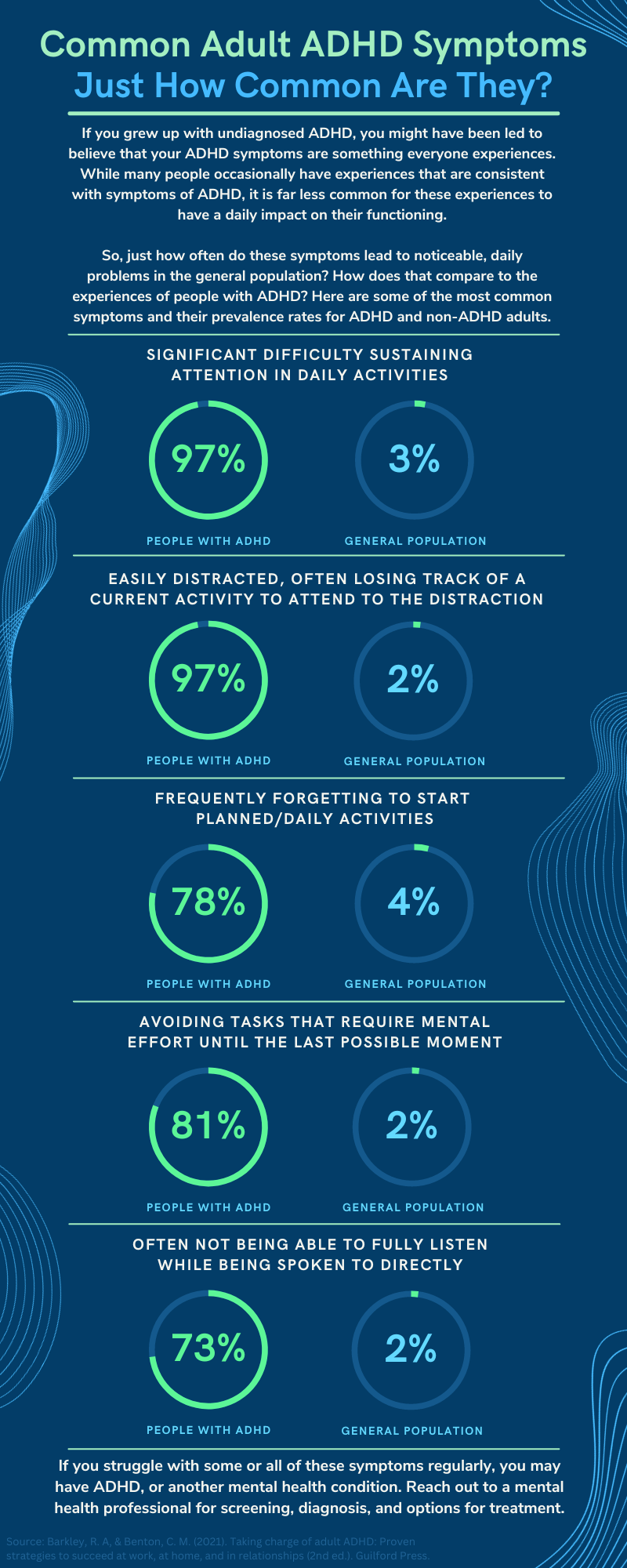Recognizing ADHD As an Adult
Attention-Deficit Hyperactivity Disorder (ADHD) is a mental health diagnosis that, as its name suggests, is characterized by chronic inattentiveness, hyperactivity, or both. As diagnostic tools have improved in recent years, ADHD has become more well-known and recognized. While many people with ADHD are diagnosed as children - it is often most noticeable in a school environment - there still remains a portion of the population who don’t receive a diagnosis until adulthood. Many do not notice their symptoms until they are well into college, employment, and beyond.
Unfortunately, ADHD symptoms do not taper off into adulthood, though these symptoms typically differ in subtle ways from their presentation in children. ADHD diagnosis and treatment for adults can provide substantial relief from symptoms previously thought to be a normal part of life.
There are several reasons why ADHD might not be noticed until you reach adulthood. One common reason for a diagnosis to be overlooked is that members of your support system - especially parents and other family members - also have ADHD, and assume your behavior to be normal. ADHD is highly hereditary, and it can be missed for generations as a result.
ADHD is also often associated with symptoms of hyperactivity, meaning those who show more inattentive symptoms might not get noticed by those who would be able to direct them to receive a diagnosis. You might have done a good job of managing your symptoms, performing well enough in education to avoid detection.
While your symptoms may not have been visible to those around you, that does not mean they were not there.
If you have lived with ADHD symptoms up to this point in your life without recognizing them, you may have a very difficult time identifying them as symptoms. Here is an infographic to help you visualize how prevalent some of those symptoms are in adults:
While you may feel like these are common occurrences that everyone deals with, if you grapple with these issues on a regular basis, you may want to seriously consider meeting with a mental health professional to be screened for a diagnosis. You may feel like these symptoms apply to you, but hesitate to seek a diagnosis because you know you are able to concentrate on things when you really put your mind to it.
It is important, then, to note that adults with ADHD often have no problem with concentrating on tasks they find stimulating, engaging, or interesting - in fact, once they’ve found an activity they enjoy, it may be difficult for someone with ADHD to concentrate on anything else! This is one reason why people with ADHD tend to gravitate toward stimulating and immediately rewarding activities, such as video games, physical work, and artistic activities. Being able to focus on specific activities like this does not preclude you from an ADHD diagnosis, especially if you find it markedly difficult to concentrate on things outside of your interests. Indeed, this “hyperfocus” might be a sign that you do, in fact, have ADHD.
Keep in mind that ADHD-like symptoms can also arise in adulthood from a few other factors. Some of these factors include the effects of aging (especially over the age of 55), sleep disorders, excessive drug use, brain damage, and other medical problems. ADHD is a developmental disorder, meaning it is a disorder that develops in childhood. If the symptoms arise suddenly and were not present in childhood, you most likely are experiencing something else.
Hopefully, this brief primer on adult ADHD has helped you better identify if you might have it - or perhaps another underlying issue. If you believe you experience these symptoms, consult with a mental health professional (and, if appropriate, your doctor) to seek out a diagnosis and start working on a treatment plan that is right for you.
References
Barkley, R. A, & Benton, C. M. (2021). Taking charge of adult ADHD: Proven strategies to succeed at work, at home, and in relationships (2nd ed.). Guilford Press.
Pettersson, R., Söderström, S., & Nilsson, K. W. (2018). Diagnosing ADHD in adults: An examination of the discriminative validity of neuropsychological tests and diagnostic assessment instruments. Journal of Attention Disorders, 22(11), 1019–1031. https://doi.org/10.1177/1087054715618788
Polanczyk, G. V., Willcutt, E. G., Salum, G. A., Kieling, C.,Rohde, L. A. (2014). ADHD prevalence estimates across three decades: an updated systematic review and meta-regression analysis. International Journal of Epidemiology, 43(2), 434–442. https://doi.org/10.1093/ije/dyt261
National Institute of Mental Health. (2021). Attention-deficit/hyperactivity disorder in adults: What you need to know (NIH Publication No. 21-MH-3572). U.S. Department of Health and Human Services, National Institutes of Health. https://www.nimh.nih.gov/health/publications/adhd-what-you-need-to-know




